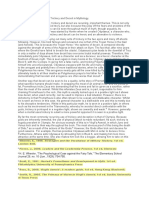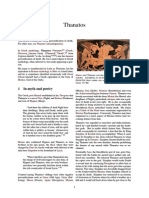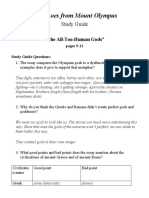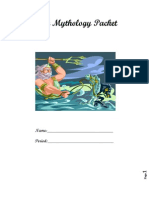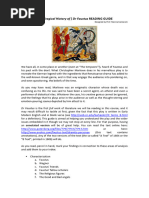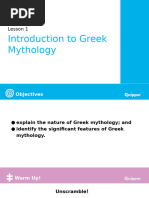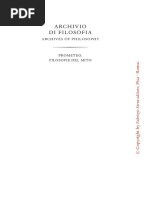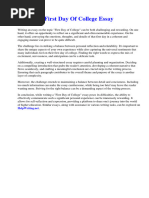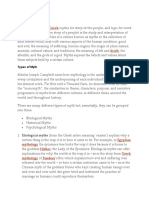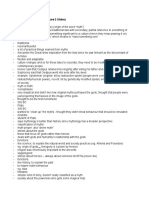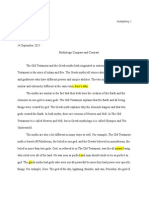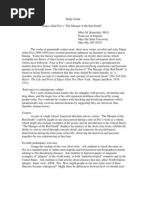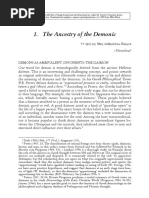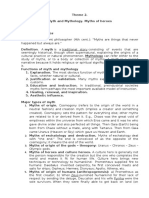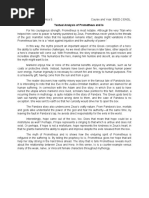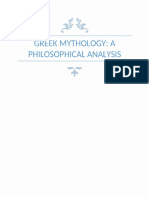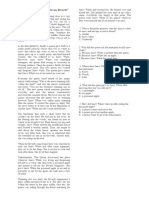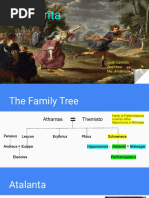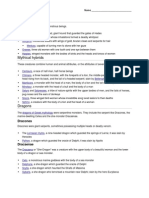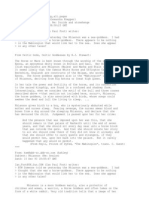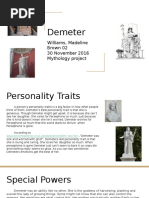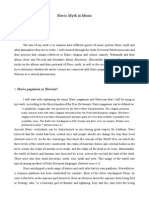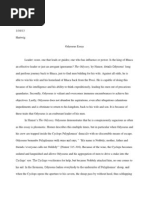Olympus Study Guide Rev 5
Olympus Study Guide Rev 5
Uploaded by
sirmatthewzCopyright:
Available Formats
Olympus Study Guide Rev 5
Olympus Study Guide Rev 5
Uploaded by
sirmatthewzOriginal Description:
Copyright
Available Formats
Share this document
Did you find this document useful?
Is this content inappropriate?
Copyright:
Available Formats
Olympus Study Guide Rev 5
Olympus Study Guide Rev 5
Uploaded by
sirmatthewzCopyright:
Available Formats
Echoes from Mount Olympus Study Guide (5)
p. 1
Echoes from Mount Olympus
Study Guide
The Prologue (pages 4 5)
Background: In these lines from the Theogony, Hesiod introduces some of the topics of Greek mythology.
Hesiod was a Greek poet in about 800 B.C. His elaborate description of the gods, their powers, and their
relationships drew on the work of Homer and on early oral traditions.
The Theogony
1. What is implied by the line Hail, children of Zeus!?
2. Where does Hesiod say the gods came from?
3. What things does Hesiod say he will explain in his work?
Discussing the Image
1. What atmosphere does the image opposite p. 4 create?
2. What does this image say to you?
Echoes from Mount Olympus Study Guide (5)
p. 2
The All-Too-Human Gods (pages 9-11)
Study Guide Questions:
1. The essay compares the Olympian gods to a dysfunctional family. What examples does it give to
support that metaphor?
2. Why do you think the Greeks and Romans didnt create perfect gods and goddesses?
3. After reading the essay, do you think you will like this book? Why or why not?
4. What good points and bad points does the essay mention about the civilizations of ancient Greece
and of ancient Rome?
Echoes from Mount Olympus Study Guide (5)
p. 3
Cluster One
Zeus and Hera
by Bernard Evslin, Dorothy Evslin, and Ned Hoopes
pages 18-21
Background:
The Titans represent one generation of gods. (Cronos is usually called a Titan.) Zeus and the
Olympians are the next generation. Many early cultures were polytheistic. They believed in more
than one deity, each with his or her own personality and relationships with other deities such as the
sun, ocean, storms, wind, war, or love. The major gods and goddesses formed a pantheon. The
Greek pantheon members mostly lived on Mount Olympus, and they often took human form.
Giving human traits or forms to non-human beings is called anthropomorphism. Thus, the
pantheon consisted of anthropomorphic deities, the Olympians. The main twelve are listed on
pages 12-13.
VOCABUALRY (read over before starting the story)
Other Unfamiliar Words & Their Definitions
(write these below as you read)
discord conict; strife
forger maker; craftsman
infidelities disloyalties; affairs
intriguers schemers; plotters
pent up shut up; confined
prophesied predicted; foresaw
swaddling tightly wrapped; restricting
tumult commotion; disturbance
_________________________________
_________________________________
_________________________________
_________________________________
_________________________________
Study Guide Questions:
1. Outline the three generations of deities described in this story.
I. _________ was the First One
A. He had a son, _______________
B. He had a sister, _______________
II. Cronos and ___________ married
(continue on next page)
Echoes from Mount Olympus Study Guide (5)
p. 4
B. Rhea gave birth to
1. _____________________
2. _____________________
3. _____________________
4. _____________________
5. _____________________
6. _____________________
III. Zeus and ________________ married
A. By _______________, Zeus fathered Ares, Hephaestus, and Eris
B. ______________ also fathered Athene, Hermes, Apollo, and Artemis, among others, by
other females
2. Using specific examples from the text, describe below at least FIVE ways in which the author portrays
the Titans and Olympians as members of a very dysfunctional family.
a) ________________________________________________________________________________
________________________________________________________________________________
b) ________________________________________________________________________________
________________________________________________________________________________
c) ________________________________________________________________________________
________________________________________________________________________________
d) ________________________________________________________________________________
________________________________________________________________________________
e) ________________________________________________________________________________
________________________________________________________________________________
(continue on next page)
Echoes from Mount Olympus Study Guide (5)
p. 5
4. This story also provides possible explanations for the origins of two or three natural phenomena, a word
and a tradition. List these below, as well as the cause(s) given for each:
a) ________________________________________________________________________________
b) ________________________________________________________________________________
c) ________________________________________________________________________________
d) ________________________________________________________________________________
e) ________________________________________________________________________________
The Firebringer
by Louis Untermeyer
pages 22-25
Pre-reading exercise:
Recall your most intense conflict with an authority figure and the outcome of that conflict.
VOCABUALRY (read over before starting the story)
destiny fate; future
fettered shackled; chained
forethought ability to think ahead
immortal deathless; ageless
manacles handcuffs; chains
tyranny dictatorship; despotism
Other Unfamiliar Words & Their Definitions
(write these below as you read)
_________________________________
_________________________________
_________________________________
_________________________________
Study Guide Questions:
l. Describe the early (unsuccessful) human races that Zeus created, and why Zeus wasnt satisfied with
them.
(continue on next page)
Echoes from Mount Olympus Study Guide (5)
p. 6
2. What was Prometheus told to use and not useto create a new race of humans?
3. Why do you think Prometheus was forbidden to take anything from the heavens?
4. Why do you think that Prometheus was disobedient and took the forbidden fire anyway? Why does
Prometheus believe that giving humans fire is more important than Zeuss threat? Did he do it for the
humans sake? For his own? Some of both? Explain.
5. Zeus is against humankinds progress and punishes Prometheus for helping achieve progress through
science and technology. Where can we see similar situations in real life?
6. How does the Prometheus story parallel somewhat the story of the creation of humans in Genesis?
7. How was Prometheus punished?
(continue on next page)
Echoes from Mount Olympus Study Guide (5)
p. 7
8. What deal did Zeus offer Prometheus eventually (p. 25)?
Why doesnt Prometheus take Zeuss offer, and what does this tell us about Prometheus character?
9. The narrator of the story tells us that Prometheus gave mankind his forethought, his fearless spirit as a
fighter against tyranny, his courage and, most of all, his compassion for all people everywhere (p. 25).
Are these qualities possessed by Prometheus? Use specific references to the story to support your point.
Are these qualities possessed by mankind in general? Use specific references to real life to support your
point.
Where in history have we seen tyrants?
Where in history have we seen people refuse to help a tyrant?
(continue on next page)
Echoes from Mount Olympus Study Guide (5)
p. 8
10. Must a person challenge authority in order to be a hero? Explain.
Extra Credit: Research
myths from other cultures,
such as Native American,
that explain how humans
acquired fire. Compare
them with the Prometheus
myth in a
compare/contrast essay of
200-300m words. Wordprocess your findings or
hand-write them VERY
neatly in pen on lined
paper. (up to 100 quiz
points)
Pandora
by Barbara McBride-Smith
pages 27-30
Background:
Using colloquial American language, Barbara McBride-Smith tells
the tale of the longstanding feud between Papa Zeus and the Metheus
brothers, Pro (Prometheus) and Epi (Epimetheus). As part of his subtle
plan, Zeus creates a woman, Pandora, for Epi to marry. Zeus gives Pandora
a beautiful box but forbids her to open it.
The story of Pandora came into prominence in the Theogony,
Hesiods epic poem, written circa 800 BC. The myth dates back to the first centuries of humanity, just after
the Titanomachy, the Great War between the Titans and the Olympians. It is interesting to note that the
reference to Pandoras Box came only in the 16th century from Erasmus of Rotterdam. The bottom line is
that the entire story about Pandora was fabricated. It may be considered as a misogynist stand that the
creation of woman was the harbinger of all evil on this world.
Note: Phestus is more properly called Hephaestus.
VOCABUALRY (read over before starting the story)
commenced began; started
Other Unfamiliar Words & Their Definitions
(write these below as you read)
_________________________________
_________________________________
_________________________________
(continue on next page)
Study Guide questions:
1. What are Pandoras qualities?
Echoes from Mount Olympus Study Guide (5)
p. 9
2. What is Zeuss wedding gift, and what is odd about it?
To what modern item does the narrator compare this gift; why?
3. What happens when Pandora finally opens her gift?
4. We are told that Pandora got a grip on herself and closed the box, but earlier we were told that she had
opened it because she was smart. What do you make of these two seemingly contradictory statements?
5. Some explanations of Pandoras name say it means all-gifted (i.e., possessing many talents) and others
gift to all. Which interpretation do you think makes more sense? Why?
6. HOPE stays in the jar and is NOT released upon the world as the rest of the contents are. The author
makes this seem like a good thing in her version here (hope is kept safe in the box), but does that actually
make sense? Explain.
(continue on next page)
7. Although this is an ancient myth, the author has the narrator use words and phrases from current
American culture; these are called anachronisms.
List at least six such anachronisms (references to modern American culture) below.
Echoes from Mount Olympus Study Guide (5)
p. 10
Which type of narration did you like best: that of The Firebringer or of this story? Why?
8. How is this story similar to the Biblical tale of Eve, the serpent, and the forbidden fruit? Use the chart
below to make comparisons:
Pandora Story
Eve Story
Pandora is the first mortal woman
(continue on next page)
9. Look at the author biography (p. 144) of the person who wrote the version of Pandora you just read.
What form do her stories usually take?
How would this form enhance the story?
Echoes from Mount Olympus Study Guide (5)
p. 11
The Wise Goddess: Athena
by Betty Bonham Lies
pages 31-33
Background:
This piece is considered more of a character study or essay than a myth. Like many myths, however, it
focuses on a competition between gods. Its main focus is the theme of WISDOM.
VOCABUALRY (read over before starting the story)
brackish salty; saline
innumerable countless; manyOther Unfamiliar
Words & Their Definitions (write these below
as you read)
_________________________________
_________________________________
_________________________________
Study Guide Questions:
1. How did Athena settle disputes?
2. Make a list of Athenas other accomplishments as depicted on p. 33.
(continue on next page)
3. How is this portrayal of a female entity in this essay different from the one put forth in Pandora?
Echoes from Mount Olympus Study Guide (5)
p. 12
4. In the concluding paragraph how does author Betty Bonham Lies define heroism and courage?
Think of at least two real-life examples of people who demonstrate this sense of heroism and courage.
Name/identify them and describe their actions below. Your descriptions should support your choices.
Apollo and Artemis: The Twins
by Ellen Switzer and Costas
Pages 35-39
VOCABUALRY (read over before starting the story)
Other Unfamiliar Words & Their Definitions
appeased satisfied; pacified
banishment exile; expulsion
chastity sexual purity
commoners ordinary people
defiled soiled; tainted
impetuous hasty; impulsive
nymph nature spirit; sprite
prophecies predictions; forecasts
_________________________________
_________________________________
_________________________________
_________________________________
_________________________________
(continue on next page)
Background: Zeus fathered children by many femalesboth mortal and immortal besides his wife the
goddess Hera. Not all these females were impregnated by Zeus willingly! In this story, Zeus mates with
Leto, who is a nymph. Nymphs were mythological nature spirits associated with particular natural or
geographical forms (such as forests or rivers) and appearing as beautiful young women. Note that three
generations are portrayed in the story: (1) Zeus and Leto; (2) Apollo and Artemis; and (3) Aesculapius.
Echoes from Mount Olympus Study Guide (5)
p. 13
Study Guide Questions:
1. Apollo established the oracle at Delphi to foretell the future. What were the Pythonesses?
What is the origin of the title Pythoness (give all the details!)?
2. Why do you think many humans today continue to seek predictions of their own futures through such
means as fortune tellers, horoscopes, and tarot readings?
Would they really want to know what the future holds for them?
How do you think fortune tellers, seers, tarot card readers, etc., are viewed in the U.S.? Why?
3. Is this ability of Aesculapius (also known as Asclepius) to bring the nearly-dead back to life universally
admired in the story? Explain.
(continue on next page)
What condition does Zeus make Aesculapius adhere to before reversing his banishment?
Echoes from Mount Olympus Study Guide (5)
p. 14
How do Aesculapius abilityas well as the reaction of others to this abilityand Zeus condition parallel
some modern-day debates about medical ethics?
4. What did Aphrodite do when Zeus reversed his judgments?
In the end, what did Apollo get instead of Daphne? What has it become symbolic of?
5. What basic differences in Greek and Roman attitudes are revealed by their worship of Apollo?
Which attitudethe Greek or the Romanis closer to the attitude of modern Americans in the U.S.? On
what evidence do you base your conclusion?
6. When Zeus asked Artemis to make a wish, what did she wish for?
(continue on next page)
Which part of these wishes did Zeus tell her she could change her mind about? Why?
Echoes from Mount Olympus Study Guide (5)
p. 15
7. Which do you think became the more interesting deity, Apollo or Artemis? Explain your choice, using
specific references to elements of the story.
8. In what ways do the children in this story give evidence of unusual gifts?
What current books, television shows or movies feature an unusual child as a hero?
9. Under what circumstances might being markedly different from peers be a blessing? A curse?
Echoes from Mount Olympus Study Guide (5)
p. 16
Cluster Two
Arachne
by Olivia E. Coolidge
pages 48-51
VOCABUALRY (read over before starting the story)
descendants children; heirs
obscure unknown; unnoticed
obstinacy stubbornness; reluctance
Other Unfamiliar Words & Their Definitions
(write these below as you read)
_________________________________
_________________________________
_________________________________
Study Guide Questions:
1. What are the different explanations for Arachnes skilled weaving? What is Arachnes response?
2. Why do other peoples comments about her skill bother Arachne?
Why wont Arachne admit the possibility that her talent for weaving is a gift from the goddess Athena?
Is Arachne truly 100 percent responsible for the beauty of what she produces (see p. 50, bottom)?
(continue on next page)
3. What does Arachne weave during the contest with Athena? What does this show about her?
Echoes from Mount Olympus Study Guide (5)
p. 17
4. What does Athena weave, and what does this show about her?
5. What does it suggest that Athena tears Arachnes tapestry before the contest can be judged?
6. Why does Athena change Arachne into a spider instead of letting her hang herself?
7. What message would you say this story send about taking pride in your talents?
Should people avoid expressing pride in their accomplishments? Why or why not?
What seems to be the difference between talent and accomplishment?
(continue on next page)
Echoes from Mount Olympus Study Guide (5)
p. 18
8. Do you find the characters and actions of Arachne and Athena worthy of admiration, disapproval, pity or
other feelings? Fill out the chart below, noting actions taken by each and your judgment about those
actions.
Character
(Athena or Arachne)
Arachne
Action
Your Judgment
Works many hours at
her craft
Admirable
9. What element of nature is this story the origin tale of?
Demeter and Persephone
by Homer, translated by Penelope Proddow
pages 56-64
VOCABUALRY (read over before starting the story)
laments expressions of sorrow
lavish extravagant; extreme
omen foreshadowing; sign
stately noble; elegant
stealthily secretly; covertly
treachery betrayal; disloyalty
Other Unfamiliar Words & Their Definitions
(write these below as you read)
_________________________________
_________________________________
________________________________
(continue on next page)
Echoes from Mount Olympus Study Guide (5)
p. 19
Background:
The blind poet Homer is best known as the author of the Iliad and the Odyssey. Little is known about him
except that he lived in the ninth century B.C. Some even think he might be fictional. However, the Homeric
style was acknowledged and imitated by poets in the sixth century B.C. Their Homeric hymns, such as
Demeter and Persephone, were presented at public festivals, probably as songs.
Note:
He Who Has Many Names and He Who Receives Many Guests refer to Hades.
When reading a poem, do not put a pause at the end of a line unless there is a mark of punctuation, such
as a comma, dash, or period, to indicate that a pause belongs there.
Study Guide Questions:
1. Why does Helios think that Hades would be a good choice as a husband?
2. Why do you think the poet refers to Zeus as black clouded?
3. Demeter is the earth goddess, responsible for growing things and for agriculture. How would you
evaluate her helpfulness to mortals?
4. Evaluate Zeuss responses to Demeter's grief. What finally got his attention and caused him to take
action?
5. Who is the first-person speaker, the I and me at the start and end of the poem?
6. Imagine you had to create three-act play based on the poem. Where would each act begin? Why?
Echoes from Mount Olympus Study Guide (5)
p. 20
(continue on next page)
7. What does this poem explain the origin of?
Persephone, Falling
by Rita Dove
page 65
Study Guide Questions:
1. In the poem, what happens to Persephone because she strayed from the herd?
2. Who is speaking in the second strophe (word group in a poem that doesnt have a regular rhyme
scheme), beginning with the word Remember?
3. What does the term strayed from the herd mean when used to describe human actions?
4. Is it a good or bad thing to stray from the herd? Explain.
5. Do your elders encourage you to stray from the herd, or do the discourage it?
Why do you think this is?
6. There has been much public discussion recently regarding whether todays parents are overly protective
of their children. What do you think, and why?
(continue on next page)
Echoes from Mount Olympus Study Guide (5)
p. 21
Cluster Three
Odysseus
by W.H.D. Rouse
pages 77-81
Background: The Trojan War, Odysseus and Penelope
According to legend, the war began after Paris of Troy kidnapped Helen of Greece. The Greek army sailed to
Troy to bring Helen back. After ten years of war, the Greeks defeated the Trojans by trickery. They built a gigantic
wooden horse and presented it to the Trojans a gift. That night Greek soldiers hidden inside the horse unlocked the
city gatesletting in the rest of the Greek army. The Trojan War was considered a myth until ruins discovered in the
nineteenth century in Turkey proved to be the site of ancient Troy. Historians now believe that Troy and Greece
actually waged a long war.
Homers Odyssey also tells the story of Penelope. For 20 years, she awaits her husbands return. During this
time, many noblemen askeven demandto marry her. She refuses to believe that Odysseus is dead but finally says
shell choose a new husband when she finishes weaving a funeral shroud for her father-in-law. She weaves by day
and at night unravels her work. When her suitors catch on, they are furious.
VOCABUALRY (read over before starting the story)
siege blockade; persistent attack
steward caretaker; manager
bowling rolling; moving quickly
sty pig pen
Other Unfamiliar Words & Their Definitions
(write these below as you read)
_________________________________
_________________________________
_________________________________
Study Guide Questions:
1. What journey does Odysseus wish to make?
2. What events delay Odysseus on his journey?
(continue on next page)
Echoes from Mount Olympus Study Guide (5)
p. 22
3. As a heroic figure, is Odysseus more of a great warrior or more of a great thinker and trickster? Provide
textual evidence for your response!
4. Why do you think Hermes gives Odysseus protection from the enchantments of Circe?
Cupid and Psyche
by Barbara McBride-Smith
pages 85-91
VOCABUALRY (read over before starting the story)
degradation disgrace; dishonor
exquisitely beautifully; perfectly
fester become infected
Other Unfamiliar Words & Their Definitions
(write these below as you read)
_________________________________
_________________________________
_________________________________
(continue on next page)
Study Guide questions:
1. Why does Cupid fall in love with Psyche? (Explain what he was supposed to do and what actually
happened.)
2. What lines in the story draw comparisons between the nature of the gods and human nature?
3. What does Psyche have to do to get Cupid back, and how does she accomplish the tasks?
4. What would you say is the moral of, or lesson conveyed by, this story? (State it in one sentence.)
5. What other story did we read by the author of this version of Cupid and Psyche?
How would you describe the authors STYLE?
How would you describe her TONE?
You might also like
- How Is Trickery Viewed in MythDocument4 pagesHow Is Trickery Viewed in MythTheo Roberts50% (2)
- The Heroes of Olympus - The Lost Hero Discussion GuideDocument10 pagesThe Heroes of Olympus - The Lost Hero Discussion GuideDisney Hyperion50% (4)
- Mythology and Folklore - English Words and Idioms EtymologyDocument6 pagesMythology and Folklore - English Words and Idioms EtymologyRosalyn Ado100% (1)
- Judgment of The Goddesses Lucian TranscribedDocument6 pagesJudgment of The Goddesses Lucian Transcribedapi-302323572No ratings yet
- ThanatosDocument5 pagesThanatosValentin Matei100% (1)
- Roman Mythology Thesis StatementDocument4 pagesRoman Mythology Thesis Statementambervoisineanchorage100% (1)
- Mythology: Gods and GoddessesDocument5 pagesMythology: Gods and GoddessesAntonette RamosNo ratings yet
- Thesis Statement For PrometheusDocument6 pagesThesis Statement For Prometheusfbzgmpm3100% (2)
- Echoes From Mt. Olympus Study GuideDocument31 pagesEchoes From Mt. Olympus Study GuidePenny CullitonNo ratings yet
- G10 - Unit 2 L.1Document29 pagesG10 - Unit 2 L.1Chin ChinNo ratings yet
- Greek Mythology Packet: Name: - PeriodDocument10 pagesGreek Mythology Packet: Name: - PeriodSopaul FanatisMoNo ratings yet
- Zeus Essay ThesisDocument8 pagesZeus Essay ThesisDereck Downing100% (2)
- DR Faustus READING GUIDEDocument10 pagesDR Faustus READING GUIDEFlorencia PereyroNo ratings yet
- Dissertation On Greek MythologyDocument7 pagesDissertation On Greek MythologyHelpMeWriteAPaperMurfreesboro100% (1)
- Greek and Canaanite MythologiesDocument10 pagesGreek and Canaanite MythologiesAnonymous WpMUZCb935No ratings yet
- English 10 - Unit 2 - Lesson 1 - Introduction To Greek MythologyDocument35 pagesEnglish 10 - Unit 2 - Lesson 1 - Introduction To Greek MythologyChin ChinNo ratings yet
- ME Eng 10 Q1 0201 - PS - Introduction To Greek MythologyDocument31 pagesME Eng 10 Q1 0201 - PS - Introduction To Greek MythologyREYMARK PERALTANo ratings yet
- Ultimate Greek Mythology: Adventurous Stories, Fun Facts, Amazing History, and Beyond!From EverandUltimate Greek Mythology: Adventurous Stories, Fun Facts, Amazing History, and Beyond!No ratings yet
- Mythology and Folklore (Mini Module)Document20 pagesMythology and Folklore (Mini Module)George Kevin TomasNo ratings yet
- MunŽoz GallarteDocument18 pagesMunŽoz GallarteAnonymous i5pNjipxj5No ratings yet
- First Day of College EssayDocument6 pagesFirst Day of College Essaytuevptvhd100% (2)
- Jason and Medea AgonDocument16 pagesJason and Medea AgonBen RogaczewskiNo ratings yet
- The Odyssey 2Document19 pagesThe Odyssey 2ozodaruziyeva49No ratings yet
- Greek Mythology Research Paper ThesisDocument5 pagesGreek Mythology Research Paper ThesisCollegePaperWritingServicesMilwaukee100% (2)
- English 8 Modul1Document55 pagesEnglish 8 Modul1Ilyn Relampago BacanNo ratings yet
- Learning Packet in Grade 10 - Lesson 1Document4 pagesLearning Packet in Grade 10 - Lesson 1ruthNo ratings yet
- MYTHOLOGY IntroductionDocument9 pagesMYTHOLOGY IntroductionJENELYN GUCORNo ratings yet
- Greek NameDocument10 pagesGreek Namecermjh21No ratings yet
- Thesis Statement Greek MythologyDocument7 pagesThesis Statement Greek Mythologyafbtfukel100% (1)
- Greek Mythology Answers To NotesDocument3 pagesGreek Mythology Answers To Notesapi-234240920No ratings yet
- Thesis About Creation MythsDocument7 pagesThesis About Creation Mythsreneedelgadoalbuquerque100% (2)
- Chloe-Lesson Prep-29 May 2024Document32 pagesChloe-Lesson Prep-29 May 2024kehanNo ratings yet
- Short Paper No. 1Document4 pagesShort Paper No. 1Lucas AssociationNo ratings yet
- What Is Mythology? (Lecture 2 Slides)Document3 pagesWhat Is Mythology? (Lecture 2 Slides)Jeonghun LeeNo ratings yet
- Prometheus Bound Essay ThesisDocument4 pagesPrometheus Bound Essay ThesisMaria Perkins100% (2)
- Masinadiong AssignmentNo1Document2 pagesMasinadiong AssignmentNo1Danny MasinadiongNo ratings yet
- Fiala - Creation Myths Ancient WorldDocument4 pagesFiala - Creation Myths Ancient WorldlgsmartNo ratings yet
- Egyptian Mythology Thesis StatementDocument6 pagesEgyptian Mythology Thesis StatementCollegePaperHelpSingapore100% (2)
- Greek Gods Thesis StatementDocument8 pagesGreek Gods Thesis Statementiapesmiig100% (2)
- Titans: How Superheroes Can Help Us Make Sense of a Polarized WorldFrom EverandTitans: How Superheroes Can Help Us Make Sense of a Polarized WorldNo ratings yet
- Term Paper About Greek MythologyDocument8 pagesTerm Paper About Greek Mythologyea8dfysf100% (2)
- Humphrey 1Document4 pagesHumphrey 1api-297201104No ratings yet
- Lesson 1 Introduction To Greek MythologyDocument10 pagesLesson 1 Introduction To Greek MythologyMaria Evelyn Won100% (2)
- Masque of The Red Death - Study - GuideDocument4 pagesMasque of The Red Death - Study - GuideVeronika M. Popic100% (1)
- I Am Sharing 'Lesson-1-Introduction-To-Mythology' With You - 221108 - 132446Document5 pagesI Am Sharing 'Lesson-1-Introduction-To-Mythology' With You - 221108 - 132446Mark James RoncalesNo ratings yet
- Documento Sem TítuloDocument3 pagesDocumento Sem TítuloLucas GonçalvesNo ratings yet
- W.S OneDocument2 pagesW.S OneKholoud TalatNo ratings yet
- Chapter 01 PDFDocument30 pagesChapter 01 PDFtelemagicoNo ratings yet
- Metamorphoses Tells of How This Came To Be, Through The Goddess' Triumph Over Her UncleDocument3 pagesMetamorphoses Tells of How This Came To Be, Through The Goddess' Triumph Over Her UncleKong Sun LimNo ratings yet
- Seminar2 Mythology Part2Document24 pagesSeminar2 Mythology Part2Dasha100% (1)
- Jean-Joseph Goux - Oedipus, PhilosopherDocument121 pagesJean-Joseph Goux - Oedipus, PhilosopherMari Vojvodovic100% (1)
- Activity 6 Textual AnalysisDocument2 pagesActivity 6 Textual AnalysisVeronica Salvador DumanopNo ratings yet
- Teacher Pack 20 - Greek GodsDocument18 pagesTeacher Pack 20 - Greek GodsJennifer MarsellaNo ratings yet
- Metaphor TropesDocument8 pagesMetaphor TropessrhjNo ratings yet
- Mythology and FolkloreDocument7 pagesMythology and FolkloreTrixia MadrigalNo ratings yet
- Exploring Greek Mythology: Unravel the Legends of Heroes, Monsters, and the Underworld, and Their Influence on Art, Literature, and Western CultureFrom EverandExploring Greek Mythology: Unravel the Legends of Heroes, Monsters, and the Underworld, and Their Influence on Art, Literature, and Western CultureNo ratings yet
- Thesis For Creation MythsDocument7 pagesThesis For Creation Mythsamberbutlervirginiabeach100% (2)
- Greek Mythology: A Philosophical AnalysisDocument13 pagesGreek Mythology: A Philosophical AnalysisMuhammad Farhan AtifNo ratings yet
- (English 4) Q1 Perio ReviewerDocument16 pages(English 4) Q1 Perio Reviewerphiakristinalibunao22No ratings yet
- Farnell, L. R. The Paradox of The Prometheus VinctusDocument12 pagesFarnell, L. R. The Paradox of The Prometheus VinctusJoaquín FloresNo ratings yet
- G6m1u2 - Modulelessons - Mid Unit 2 Assessment 0220 - 0Document12 pagesG6m1u2 - Modulelessons - Mid Unit 2 Assessment 0220 - 0KiyrahNo ratings yet
- Brooke ADocument11 pagesBrooke Aapi-273519680No ratings yet
- Deities of The WitchesDocument159 pagesDeities of The WitchesCarolina Perez Mendoza100% (2)
- AphroditeDocument6 pagesAphroditeAngelito Jr PagatpatNo ratings yet
- The Snow White and Seven DwarfsDocument2 pagesThe Snow White and Seven DwarfsPramuka SMPN2PGRNo ratings yet
- World Ancient GodsDocument5 pagesWorld Ancient GodsJaiGaneshNo ratings yet
- Clash of The Titans SummaryDocument3 pagesClash of The Titans SummarySianna Lumbania100% (1)
- AtalantaDocument14 pagesAtalantaapi-486736619No ratings yet
- Mythical MonstersDocument2 pagesMythical Monstersdrpoe62588No ratings yet
- Sample The Graces WorksheetsDocument9 pagesSample The Graces WorksheetsRabeel AfzalNo ratings yet
- AphroditeDocument8 pagesAphroditeapi-3755120100% (2)
- AENEID With ElementsDocument4 pagesAENEID With ElementsHannah Mae Zamora RosalesNo ratings yet
- RHIANNONDocument2 pagesRHIANNONreadingsbyautumnNo ratings yet
- Greek MythologyDocument48 pagesGreek MythologyMayank01071991100% (1)
- NomenDocument4 pagesNomenGabriela MccawleyNo ratings yet
- Greek NamesDocument16 pagesGreek Nameskissofdeath_20No ratings yet
- The Difference Between Norse Gods and Greek GodsDocument5 pagesThe Difference Between Norse Gods and Greek GodsAndy Angelo100% (1)
- Greek Gods and GoddessesDocument34 pagesGreek Gods and GoddessesLyanne Mykah Malalis100% (1)
- The Odyssey Final DraftDocument3 pagesThe Odyssey Final Draftapi-390329599No ratings yet
- Williams Madeline - 02 DemeterDocument9 pagesWilliams Madeline - 02 Demeterapi-358747849No ratings yet
- Mead - of - Poetry Processed SAM MjodrDocument1 pageMead - of - Poetry Processed SAM MjodryouaresoundNo ratings yet
- Start of Trojan War SCRIPTDocument3 pagesStart of Trojan War SCRIPTlevel xxiiiNo ratings yet
- Slavic Myth in MusicDocument12 pagesSlavic Myth in MusicAnnaNo ratings yet
- Signy and Siguard The Norse GodsDocument4 pagesSigny and Siguard The Norse GodsCheska OaferinaNo ratings yet
- Hist Myth Dagda Father God Figure - HTMLDocument4 pagesHist Myth Dagda Father God Figure - HTMLJustinNo ratings yet
- PanDocument29 pagesPanTine GalaponNo ratings yet
- Odysseus EssayDocument2 pagesOdysseus Essayapi-224252225No ratings yet
